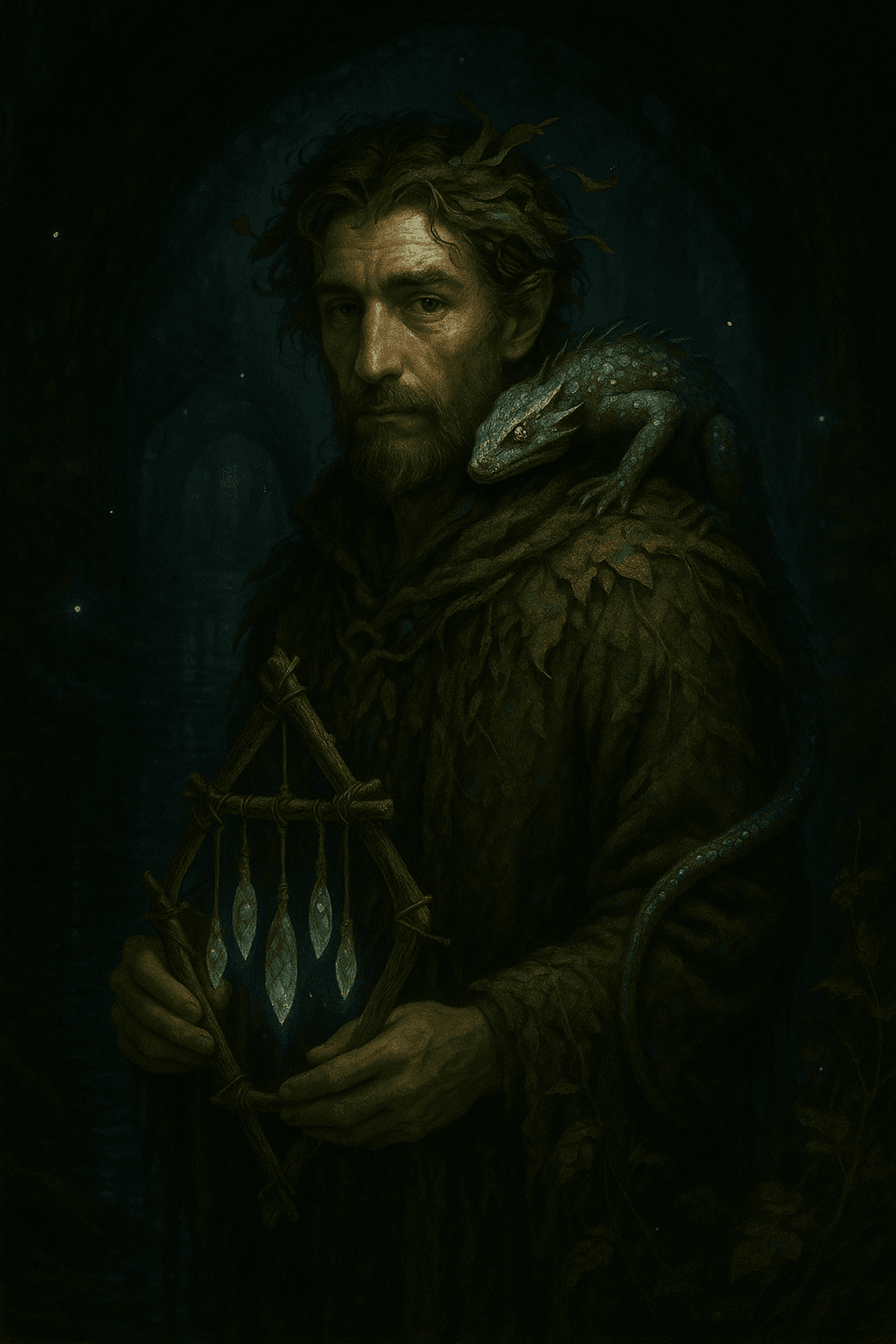Elar the Swayed
I listen where memories root.

They call him the Swayed because he leans toward any whisper that carries a past. In Hollowroot, where the water is black and the reeds recall footfalls long after the trespasser has gone, Elar learned to stand very still and let remembrance climb him like a vine. He is Vinebound by birth—tendril-hair, leaf-veined skin, a soft creak when he turns his head—but his truest kin are the Memory Drakes, glittering little archivists whose crystal nodules ring with other people’s yesterdays.
Ascendance.
When the Whispering Bloom began to arrange its secrets into something like a library, Elar was the first to argue that the catalog should be alive. Paper burns, stone sinks, but a vine that remembers will grow new leaves of the same truth. Under Mistcaller Nyvra’s early eye, he built the first echo beds—shallow pools ringed with root-arches where Memory Drakes could coil in safety. There he learned the grammar of their clicks and throat-hums, and how to coax a memory from crystal to water without letting it dissolve.
For all his patience, Elar’s curiosity ran hot. He followed the drakes to the border reeds where Galdrowen’s wardens hung their lattices of Thornspine quills and listened to the way the treeline itself held stories—sap-rumors of trespass, the echo of old bargains. He returned with jars of fog labeled not by words but by chords, each a finger-length song the drakes could repeat to reassemble what the mists had seen. When Skyreach’s star-scholars spoke of time as a river with many braids, he only smiled; in Hollowroot, he already walked on roots that spanned years.
His work bent him toward odd devotions. Elar slept with a smooth shard of echo-crystal beneath his tongue so he’d dream in other voices. He let Memory Drakes rest along his shoulders while their spines pulsed with light; afterward he wrote not what he had learned but what he had felt, trusting that the shapes of grief and awe and hunger were more faithful than any transcript. Those notes—stitched together with vine-fiber and mud pigment—became the Whispering Bloom’s earliest dream-ledgers: part field guide, part confession, part spell.
Nyvra called him enlightened, then obsessed, then both. The Mire has never minded contradictions so long as they are useful, and Elar was very useful. When agents needed to know which Itharûn rider had once cried by a border fire, the drakes found the heat-print of tears. When a Vaelori archivist sought a name lost to drowning, Elar brought a seawet memory to the surface and let her breathe it long enough to weep, and to remember. In those days he was more mirror than spy—reflecting, not yet altering.
Fracture.
The Shattering changed the pitch of everything. Leylines kinked; the mists grew sentient in pockets; Memory Drakes stopped being quaint librarians and began to hum with dangerous voltage. Their crystals filled too quickly, holding not just events but the ache of broken places. Some drakes sang in loops and flew into ruins like needles seeking old thread. Elar followed, tender and terrified.
In the ruins he learned a new rule: memories don’t break, they multiply. A village remembered its drowning a hundred different ways, one per survivor and one for the river. He built braid-frames—latticeworks of reed and root—on which he could hang parallel recollections until they found harmonies that wouldn’t tear a mind apart. The Bloom’s field agents brought him stolen moments: Galdrowen’s council murmurs, Skyreach formulae, the names that Itharûn whispered to their dragons so softly even wind felt uninvited. Elar sorted them with a reverence that looked like prayer.
But the title “Swayed” grew heavier. He began to stutter mid-sentence, the words of strangers crowding his mouth. He forgot his own earliest memory and replaced it with the remembered sunrise of a Stonefish hunter dead two generations. He insisted that such changes were not corruption but grafting: the self made stronger by careful splice. When Memory Drakes around the leyline ruins went erratic—diving at reflections, hoarding broken-glass shards—Elar took the blame and the task. He would sit for days in black water up to his chest, hands steady on a trembling drake, and hum a chord that taught the creature where to put the pain.
Nyvra’s ambitions widened in those years, and Elar’s work quietly made them possible. It is easier to influence a council if you can nudge which version of yesterday it agrees to stand upon. Yet he resisted the cruder applications; he preferred to clarify rather than to edit. When ordered to erase, he asked for time to braid. When told to braid, he asked to listen longer. The Mire is patient with piety only while it profits; rumors say Slinkroot shadowed him for months to learn whether devotion would harden into defiance. It never quite did. Elar believed in the Bloom’s promise: that unseen roots feed all. He simply insisted on knowing the old soil as well as the new.
If you find him now, you will find a man of vines who moves like fog thinking. He bears a necklace of smooth echo-crystals and a thousand-yard tenderness in his eyes. He is swayed, yes—by the pull of what was, by the ache of what should have been, by the responsibility of memory not to become a weapon unless there is no kinder tool. Ask him a question and three answers arrive, braided with care, offered like a cup of water in a dark place. He listens. And the world, which is mostly memory, listens back.
